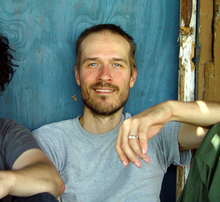Loading AI tools
American video game designer From Wikipedia, the free encyclopedia
Jason Rohrer (born November 14, 1977) is an American computer programmer, writer, musician, and game designer. He publishes most of his software into the public domain (public-domain software) and charges for versions of his games distributed on commercial platforms like the iPhone appstore or Steam.[1][2][3] He is a graduate of Cornell University.[4][5] From 2004 until 2011 he practiced simple living, stating in 2009 that his family of four had an annual budget of less than $14,500.[6] They have since relocated from Las Cruces, New Mexico to Davis, California.[7] In 2005 Jason Rohrer worked on a local currency, called North Country Notes (NCN), for Potsdam, New York.[8][9][10] In 2016 Rohrer became the first videogame artist to have a solo retrospective in an art museum. His exhibition, The Game Worlds of Jason Rohrer, was on view at The Davis Museum at Wellesley College until June 2016.[11]
Jason Rohrer | |
|---|---|
 Rohrer in 2012 | |
| Born | November 14, 1977 |
| Occupation(s) | Computer programmer, game designer, writer, musician |



Rohrer has placed most of his creative work, like video games' source code and assets, into the public domain as he is a supporter of a copyright-less free distribution economy.[12] Many of his project are hosted on SourceForge.[13]
At the 2011 Game Developers Conference Rohrer won the annual Game Design Challenge by proposing a game that could only be played once by a single player and then passed on to another.[33] This idea was based on stories of his late grandfather that had been passed down. He stated "We become like gods to those who come after us." With this in mind he created a Minecraft mod, Chain World, that was put on a single USB flash drive, which he then passed to an audience member. The rules of the game were simple: No text signs are allowed in the game, players may play until they die once, upon respawning they must quit the game and the game must then be passed onto someone that is interested and willing to respect the rules.
In March 2013 the Game Design Challenge was held at the Game Developers Conference for the final time. Its theme was "Humanity's Final Game." Rohrer was among the six contestants and won with his entry A Game For Someone, a physical game constructed of titanium. After its completion Rohrer buried it in an undisclosed location in the Nevada desert. At the challenge he released lists containing over one million discrete GPS coordinates, one of which was the actual burial spot. He estimated that with coordinated searching it would take at least 2,700 years to locate the game.[34]
In February 2016, the Davis Museum at Wellesley College exhibited The Game Worlds of Jason Rohrer, the first museum retrospective dedicated to the work of a single video game maker. The museum stated "Rohrer's exhibited work is deft, engaging, and often surprisingly moving. It refers to a diverse set of cultural influences ranging from the fiction of Borges to Black Magic; at the same time, it also engages pressing emotional, intellectual, philosophical, and social issues. Rohrer's substantial recognition, which has included feature coverage in Wired, Esquire and The Wall Street Journal, as well as inclusion in MoMA's initial videogame acquisition, has been built on a singularly fascinating body of games. These range from the elegantly simple—such as Gravitation (2008), a game about flights of creative mania and melancholy—to others of Byzantine complexity. The exhibition featured four large build-outs that translate Rohrer’s games into unique spatial experiences, alongside a section dedicated to exploring a large body of his work."[11] The exhibit was designed by IKD,[35] a Boston-based design firm.
In August 2005, Rohrer and his wife were arraigned for violating a local ordinance prohibiting grass taller than 10 inches. Representing himself, he successfully argued that natural landscaping had environmental benefits, and that the mowing ordinance was being enforced on them "in a manner that violates the free speech, equal protection, and due process clauses of the United States and New York constitutions." The court found that the statute was overly broad, and he was acquitted of all charges on June 12, 2006.[39][40]
Seamless Wikipedia browsing. On steroids.
Every time you click a link to Wikipedia, Wiktionary or Wikiquote in your browser's search results, it will show the modern Wikiwand interface.
Wikiwand extension is a five stars, simple, with minimum permission required to keep your browsing private, safe and transparent.